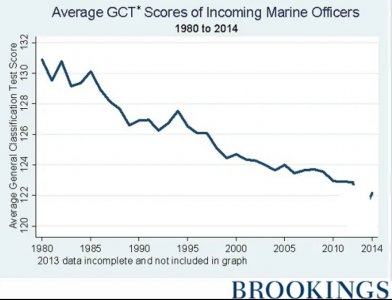Blizzard
Member
- Joined
- Dec 10, 2012
- Messages
- 4,381
I didn't really want to start a new thread -- I thought there was a similar topic somewhere but couldn't find it...
Anyway, came across the following article today:
You aren’t wrong: Our military officers actually seem to be getting stoopider
The article is a bit dated now (published 2017) and we can debate the merits of the publisher, but it still makes some interesting observations, such as:
“two-thirds of the new officers commissioned in 2014 would be in the bottom one-third of the class of 1980; 41 percent of new officers in 2014 would not have qualified to be officers by the standards held at the time of World War II.”
and
“In 1980, there were 14 Marine officers entering who scored above 155 (on a test with a maximum score of 160). In 2004, the year of incoming officers who are now recently promoted majors, there were only two lieutenants who scored above 155. In 2014, there were none.”
The article is focused on Marine Corps Officers, but, once we move past the sensationalized headline, it's reasonable to assume these figures hold true for other services as well.

Do you agree with the findings/statements in this article?
Are the services doing an acceptable job of attracting some of our best and brightest into the officers corps? If not, how do they change this?
Anyway, came across the following article today:
You aren’t wrong: Our military officers actually seem to be getting stoopider
The article is a bit dated now (published 2017) and we can debate the merits of the publisher, but it still makes some interesting observations, such as:
“two-thirds of the new officers commissioned in 2014 would be in the bottom one-third of the class of 1980; 41 percent of new officers in 2014 would not have qualified to be officers by the standards held at the time of World War II.”
and
“In 1980, there were 14 Marine officers entering who scored above 155 (on a test with a maximum score of 160). In 2004, the year of incoming officers who are now recently promoted majors, there were only two lieutenants who scored above 155. In 2014, there were none.”
The article is focused on Marine Corps Officers, but, once we move past the sensationalized headline, it's reasonable to assume these figures hold true for other services as well.

Do you agree with the findings/statements in this article?
Are the services doing an acceptable job of attracting some of our best and brightest into the officers corps? If not, how do they change this?
